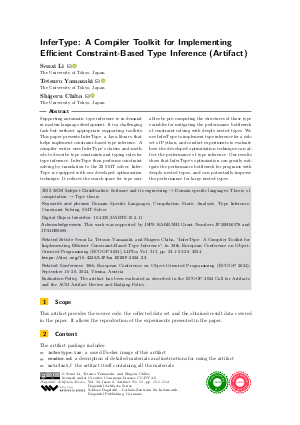InferType: A Compiler Toolkit for Implementing Efficient Constraint-Based Type Inference (Artifact)
Authors
Senxi Li  ,
Tetsuro Yamazaki
,
Tetsuro Yamazaki  ,
Shigeru Chiba
,
Shigeru Chiba 
-
Part of:
Issue:
Special Issue of the 38th European Conference on Object-Oriented Programming (ECOOP 2024)
Part of: Volume: DARTS, Volume 10 (ECOOP 2024)
Part of: Conference: European Conference on Object-Oriented Programming (ECOOP)
Part of: Journal: Dagstuhl Artifacts Series (DARTS) - License:
 Creative Commons Attribution 4.0 International license
Creative Commons Attribution 4.0 International license
- Publication Date: 2024-09-12
Artifact Description

PDF
DARTS.10.2.11.pdf
- Filesize: 460 kB
- 2 pages
Document Identifiers
Subject Classification
ACM Subject Classification
- Software and its engineering → Domain specific languages
- Theory of computation → Type theory
Keywords
- Domain Specific Languages
- Compilation
- Static Analysis
- Type Inference
- Constraint Solving
- SMT Solver
Metrics
- Access Statistics
-
Total Accesses (updated on a weekly basis)
0PDF Downloads0Metadata Views
Abstract
Supporting automatic type inference is in demand in modern language development. It is a challenging task but without appropriate supporting toolkits. This paper presents InferType, a Java library that helps implement constraint-based type inference. A compiler writer uses InferType’s classes and methods to describe type constraints and typing rules for type inference. InferType then performs constraint solving by translation to the Z3 SMT solver. InferType is equipped with our developed optimization technique. It reduces the search space for type variables by pre-computing the structures of those type variables for mitigating the performance bottleneck of constraint solving with deeply nested types. We use InferType to implement type inference for a subset of Python, and conduct experiments to evaluate how the developed optimization technique can affect the performance of type inference. Our results show that InferType’s optimization can greatly mitigate the performance bottleneck for programs with deeply nested types, and can potentially improve the performance for large nested types.
Cite As Get BibTex
Senxi Li, Tetsuro Yamazaki, and Shigeru Chiba. InferType: A Compiler Toolkit for Implementing Efficient Constraint-Based Type Inference (Artifact). In Special Issue of the 38th European Conference on Object-Oriented Programming (ECOOP 2024). Dagstuhl Artifacts Series (DARTS), Volume 10, Issue 2, pp. 11:1-11:2, Schloss Dagstuhl – Leibniz-Zentrum für Informatik (2024)
https://doi.org/10.4230/DARTS.10.2.11
BibTex
@Article{li_et_al:DARTS.10.2.11,
author = {Li, Senxi and Yamazaki, Tetsuro and Chiba, Shigeru},
title = {{InferType: A Compiler Toolkit for Implementing Efficient Constraint-Based Type Inference (Artifact)}},
pages = {11:1--11:2},
journal = {Dagstuhl Artifacts Series},
ISBN = {978-3-95977-342-3},
ISSN = {2509-8195},
year = {2024},
volume = {10},
number = {2},
editor = {Li, Senxi and Yamazaki, Tetsuro and Chiba, Shigeru},
publisher = {Schloss Dagstuhl -- Leibniz-Zentrum f{\"u}r Informatik},
address = {Dagstuhl, Germany},
URL = {https://drops.dagstuhl.de/entities/document/10.4230/DARTS.10.2.11},
URN = {urn:nbn:de:0030-drops-209094},
doi = {10.4230/DARTS.10.2.11},
annote = {Keywords: Domain Specific Languages, Compilation, Static Analysis, Type Inference, Constraint Solving, SMT Solver}
}
Author Details
Acknowledgements
This work was supported by JSPS KAKENHI Grant Numbers JP20H00578 and JP24H00688.
Artifact
DARTS-10-2-11-artifact-b3eaf63b5c866ef2ae3af9ae20e309d7.zip
(Filesize: 484.63 MB)
MD5 Sum:
b3eaf63b5c866ef2ae3af9ae20e309d7
(Get MD5 Sum)
Artifact Evaluation Policy
The artifact has been evaluated as described in the ECOOP 2024 Call for Artifacts and the ACM Artifact Review and Badging Policy.
